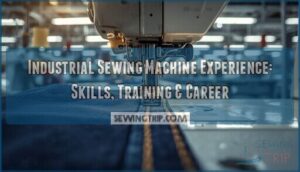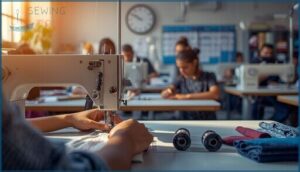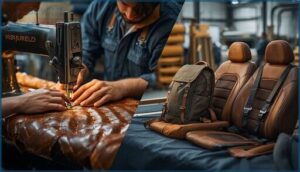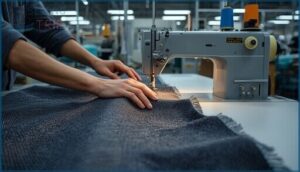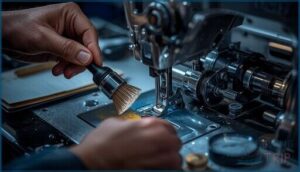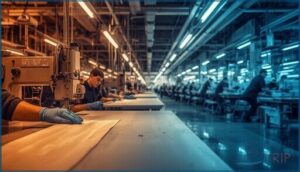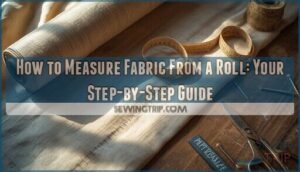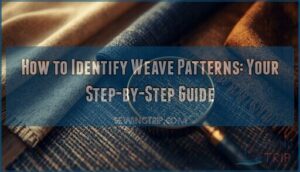This site is supported by our readers. We may earn a commission, at no cost to you, if you purchase through links.
The first time you step up to an industrial sewing machine, you realize immediately that you’re not threading your grandmother’s Singer. These powerhouses run at speeds exceeding 5,000 stitches per minute, handling materials from gossamer silk to quarter-inch leather without breaking stride.
Your foot hovers over a pedal that reacts to the slightest pressure, transforming raw fabric into finished products that meet exacting production standards. Mastering industrial sewing machine experience means developing a technician’s precision, a machinist’s understanding of mechanical systems, and a craftsperson’s eye for quality—all while your hands move with practiced efficiency across cutting tables and presser feet.
Whether you’re drawn to the thundering rhythm of a factory floor or building specialized skills for custom fabrication, this journey transforms how you approach textile production at every level.
Table Of Contents
Key Takeaways
- Industrial sewing machines operate at 1,000-5,000 stitches per minute and handle materials from silk to quarter-inch leather, requiring a distinct skill set that combines technical precision, mechanical understanding, and quality control far beyond domestic sewing capabilities.
- Training programs range from intensive 13-day boot camps to six-month courses, with hands-on instruction delivering 40% better skill retention and 60% higher employment rates compared to online formats, though you’ll need to invest $1,500-$3,000 in equipment for self-paced learning.
- The global industrial sewing market is projected to grow from $6.9 billion to $11.2 billion by 2035, with approximately 12,500 entry-level openings annually offering $25,000-$40,000 salaries and clear advancement paths from operator to supervisor roles.
- Mastery requires developing five core competencies—machine setup and calibration, material handling techniques, daily maintenance protocols, quality assurance practices, and troubleshooting skills—that together reduce defect rates by 15-20% and position you for specialized roles in automotive, fashion, or technical manufacturing.
What is Industrial Sewing Machine Experience?
Industrial sewing machine experience means you’ve moved beyond home crafting into the sphere of professional-grade equipment and production-level work. You’ll develop a distinct skill set that separates hobbyists from people who can operate powerful machines built for speed, precision, and durability.
Let’s break down what defines this experience, how it differs from what you already know, and the specific machines you’ll encounter.
Definition and Key Skills
Industrial sewing machine experience means you’ll command heavy-duty equipment built for high-volume production across garments, upholstery, and leather goods. Your mastery includes operating single-needle, overlock, and serging machines while adjusting thread tension and troubleshooting malfunctions.
You’ll handle industrial fabric with precision, interpret patterns flawlessly, and maintain quality standards through expert machine maintenance and operator safety practices that transform raw materials into finished products.
Industrial sewing machine operators require training in sewing machine operations to work efficiently.
Differences From Domestic Sewing
Speed separates you from hobbyists—industrial machines thunder at 1,000 to 5,000 stitches per minute versus domestic models limping at 500 to 1,000. You’ll master fabric capability through heavier materials like leather and canvas that would choke household equipment.
Industrial machines deliver 1,000 to 5,000 stitches per minute and handle leather and canvas that would destroy domestic equipment
Machine durability means eight-hour shifts without overheating, while stitch quality remains impeccable through automated tension control.
These operational differences demand serious sewing machine training before you touch production-grade industrial sewing machine operation. Understanding the key differences in industrial sewing is vital for effective machine use.
Types of Industrial Sewing Machines
Now that you’ve grasped operational intensity, you’ll encounter five dominant machine categories. Lockstitch machines handle general construction, while overlock sewing finishes edges at 7,000 stitches per minute. Bartack operations reinforce stress points with programmable patterns, and buttonhole equipment automates closures. Specialized stitching includes industrial walking foot sewing machine models for heavy materials.
Mastering industrial sewing machine operation across these types separates trained machinists from novices during sewing machine training.
Learning Industrial Sewing: Courses and Training
Getting started with industrial sewing means finding the right training program that fits your schedule and learning style. Whether you’re working full-time or can commit to intensive hands-on sessions, you’ll need to understand what each option offers before you invest your time and money.
Let’s break down the key factors that’ll shape your learning experience and set you up for success.
Course Structure and Duration
You’ll find industrial sewing machine courses ranging from intensive 13-day boot camps to extensive six-month programs, depending on your career goals.
Most standard training spans three weeks to six months, with curriculum design balancing approximately 60 hours of theory against 240 hours of hands-on practice.
Class duration usually runs three to six days weekly, giving you focused learning outcomes in sewing machine operation, maintenance, and quality control.
Hands-on Vs. Online Programs
Choosing between workforce training programs shapes your journey in industrial sewing education more than you might expect. Here’s what separates these learning paths:
- Skill Retention: Hands-on apprenticeship programs deliver 40% better practical retention than self-paced online courses, with immediate feedback correcting errors 50% faster.
- Training Costs: Online programs cut expenses by 40%, though you’ll invest $1,500-$3,000 in equipment versus included industrial sewing machine operation access in physical classes.
- Program Flexibility: 65% choose online formats for scheduling freedom, while in-person mentorship roles provide direct guidance 75% of trainees receive.
- Learning Outcomes: Hands-on graduates achieve 60% higher employment rates within six months, mastering sewing machine operation through supervised practice that online formats can’t replicate without supplemental experience.
Essential Curriculum Topics
Your mastery over industrial sewing machines starts with thorough curriculum foundations that transform beginners into skilled operators. Core training in Sewing Machine Fundamentals spans 240 hours, covering lockstitch and overlock operation, while Fabric Handling Techniques teach you to adjust tension for leather, denim, and silk.
Industrial Stitching Methods include French seams and flat-felled finishes, complemented by Garment Construction Principles and Sewing Pattern Development that prepare you for real Textile Production Techniques in professional settings.
Instructor Expertise and Class Size
Instructor training and teacher expertise directly shape your learning outcomes in industrial sewing machine operation. Programs with 5-15 years of seasoned professionals deliver 25% faster skill mastery, while class size limits of 4-8 students maximize student engagement and hands-on sewing techniques practice.
- Expert instructors reduce your common sewing errors by 35%
- Smaller classes boost course completion rates by 22%
- Individual attention improves machine troubleshooting by 40%
- Ideal ratios accelerate your sewing career development considerably
Real-World Applications of Industrial Sewing
Industrial sewing machines power the production of everyday items you rely on, from the upholstery in your car to the gear you wear outdoors. Once you’ve mastered the fundamentals through structured training, you’ll discover how these skills translate into tangible products across multiple industries. Here’s where your expertise creates real-world impact.
Upholstery and Automotive Production
You’ll find yourself sewing automotive interiors like headliners, seat covers, and convertible tops—materials ranging from synthetic fibers to leather that demand walking foot precision.
Industrial sewing machine operation in upholstery manufacturing requires handling heavy-duty fabrics at speeds reaching 2,500 stitches per minute, while sewing machine automation permits programmable pattern storage for rapid changeover.
Your sewing techniques directly impact vehicle upholstery quality and industrial fabrication efficiency across upholstery materials.
Apparel and Fashion Manufacturing
Fashion manufacturing drives global textile innovation, with machines hitting 5,500 stitches per minute on straight stitch models like the Juki DDL-8700.
You’ll master garment construction through specialized lockstitching, overlocking, and blind hemming operations that boost manufacturing efficiency by 9%.
Sewing technology evolution—from automated thread trimming to computerized controls—transforms apparel production, while your sewing techniques determine garment quality across fashion trends requiring precision and speed.
Sports Equipment and Outdoor Gear
Walking foot machines dominate gear manufacturing, handling PVC-coated outdoor textiles and layered canvas that crush domestic equipment.
Your industrial sewing machine operation skills enable sports apparel production, requiring spandex stretch control and polyester precision.
Bar tacking reinforces tent seams, while high-torque sewing techniques conquer backpack construction—equipment design demands you master stitch reinforcement through specialized industrial sewing machine training for technical outdoor textiles.
Developing Skills as an Industrial Sewing Machinist
Mastering industrial sewing isn’t just about running a machine—it’s about developing a complete skill set that transforms you into a trusted professional. From the moment you power up your walking foot machine to the final quality check, every step demands precision, knowledge, and confidence.
Let’s break down the core competencies you’ll need to build your reputation and advance your career in this fast-paced field.
Machine Operation and Setup
Your command of Industrial Sewing Machine Operation begins with machine calibration—the foundation that transforms raw capability into precision. Before you stitch a single seam, you’ll master five critical setup components:
- Attach the presser foot correctly for your fabric type
- Position and secure the needle with the flat side oriented properly
- Thread Management through all guides and tension discs
- Adjust thread tension settings based on material thickness
- Complete Safety Protocols including lubrication checks
This structured approach reduces defect rates by 15-20% while building the confidence you need to operate Automated Equipment efficiently. When you understand how Industrial Machines respond to proper setup, you’ll cut your preparation time from fifteen minutes down to five—freeing you to focus on perfecting your Sewing Techniques rather than troubleshooting preventable issues.
Material Handling Techniques
Once your machine runs smoothly, mastering Material Handling in Sewing unlocks true efficiency. Fabric Movement represents up to 30% of your production costs—that’s why Ergonomic Handling protocols and strategic Material Flow design matter.
Whether you’re positioning heavy rolls for upholstery or guiding delicate textiles through industrial sewing machines, proper Textile Logistics prevents defects while Automated Systems reduce your physical strain by 20%.
Maintenance and Troubleshooting
Daily lint removal and weekly lubrication transform your industrial sewing machines from temperamental tools into precision instruments.
When you master Troubleshooting Tips—fixing thread breakage, skipped stitches, or bobbin tangles—downtime vanishes.
Machine Maintenance protects your investment: quarterly Equipment Calibration and annual Machine Repair services keep timing aligned and Sewing Safety risks low.
Following strict Maintenance Schedules cuts repair costs dramatically while extending your machine’s productive years.
Quality Assurance Practices
Beyond keeping your machines running smoothly, you’ll need sharp Quality Control instincts. Defect Monitoring starts at your station—catching skipped stitches and seam irregularities before they multiply downstream. Material Inspection and Statistical Analysis tools like Pareto charts reveal patterns you can’t ignore:
- Random bundle sampling catches errors at 5-piece intervals
- Automated Testing systems flag deviations instantly
- Zero-defect targets drive your quality control standards
- Real-time corrections prevent costly rework cycles
Master these Quality Assurance in Sewing practices, and you’ll stand out.
Career Opportunities With Industrial Sewing Experience
Once you’ve built your skills on industrial machines, the job market opens up in ways that might surprise you. The demand for trained machinists spans multiple industries, from high-volume apparel production to specialized technical manufacturing.
Let’s look at where your experience can take you, how the industry’s evolving, and what paths exist for those ready to push beyond entry-level work.
Entry-Level Job Prospects
You’ll find approximately 12,500 entry-level openings annually in apparel production and related sectors, with salary expectations ranging from $25,000 to $40,000. Most roles don’t require formal degrees but value workforce training or industrial sewing certification.
Entry requirements usually include basic machine operation, thread tension adjustment, and fabric handling—entry-level skills you can master through targeted programs. Training availability varies, though on-the-job learning remains common.
Industry Growth and Market Trends
Global trends reveal momentum you can capitalize on: the industrial sewing market is climbing from $6.9 billion to a projected $11.2 billion by 2035, fueled by automation, technological advancements in smart machinery, and expanding sectors like automotive and e-commerce customization.
Manufacturing industry investments in automated equipment, energy-efficient textile production, and workforce training programs signal sustained growth projections—positioning your skills at the center of industry insights shaping tomorrow’s landscape.
Advancement and Specialization Paths
Mastering industrial sewing unlocks career progression through specialized training and skill diversification—from junior operator to supervisor over nine years. You’ll develop technical expertise in automated systems, smart textiles, and CAD/CAM integration, while leadership development transforms you into a mentor guiding teams.
Apprenticeship certification programs and workforce development initiatives in manufacturing skills accelerate your career advancement, positioning you to command premium compensation in high-demand sectors.
Frequently Asked Questions (FAQs)
Is industrial sewing experience required?
No, you don’t strictly need prior experience to start—about 49% of manufacturers report hiring challenges precisely because they’ll train beginners.
However, demonstrable skills dramatically improve your prospects and earning potential from day one.
What is an industrial sewing machine?
An industrial sewing machine is a heavy-duty powerhouse built for continuous commercial operation.
Engineered with sturdy materials and specialized mechanics, it handles thick fabrics, delivers precise stitching, and sustains high-speed production demands.
How do I become a sewing machinist?
Breaking into this field isn’t rocket science—start with sewing machine basics and industrial fabric handling, then pursue machinist certification through hands-on training programs covering industrial sewing machine operation, garment construction, and sophisticated sewing techniques.
What can I do with an 8 week sewing course?
You’ll gain machine mastery and sewing techniques for basic garment construction, complete multiple sewing projects, and develop fabric selection skills.
This program also provides access to entry-level career paths in apparel production and industrial sewing operations.
How do I become an entry-level sewing machinist?
You’ll need a high school diploma, then pursue sewing apprenticeships or machinist training programs combining hands-on practice with technical instruction.
Entry requirements emphasize job readiness through garment construction skills and apparel production experience building career pathways.
Can you learn sewer skills on the job?
Yes, you can develop sewer skills through on-the-job training. Many employers hire entry-level candidates without experience, offering hands-on workplace learning through apprenticeship programs that build practical work experience and sewing skills progressively.
What is the job description for industrial sewing machine operator?
An industrial sewing machine operator joins, reinforces, and assembles materials using specialized equipment like lock stitch and serger machines.
You’ll adjust settings, perform quality checks, maintain equipment, and follow strict safety protocols throughout production.
Is it worth getting an industrial sewing machine?
If you’re eyeing explosive productivity gains, the answer hinges on your workload.
Cost analysis shows industrial machines deliver exceptional production speed, fabric handling, and durability—worthwhile when volume justifies the investment returns.
What does an industrial sewing machine do?
You’re commanding powerful automated equipment built for high-speed production. Industrial machines handle heavy fabric handling with precise industrial stitching—from lockstitch to overlocking.
They transform raw materials into finished products through sophisticated sewing techniques and automated sewing capabilities.
What does an industrial sewing machinist do?
You’ll master the entire production universe—from threading precision machines and selecting fabrics to executing impeccable stitching techniques, maintaining equipment, inspecting seam quality, and troubleshooting malfunctions that would halt any manufacturing line.
Conclusion
The paradox of industrial sewing machine experience is that the faster your machines run, the more deliberate your movements become. Every stitch you execute at five thousand cycles per minute demands the focused calm of a surgeon’s hand.
You’ve learned that true mastery isn’t about speed—it’s about controlling power with precision. As your skills deepen, you’ll find that textile production transforms from mechanical repetition into something closer to controlled artistry at scale.

